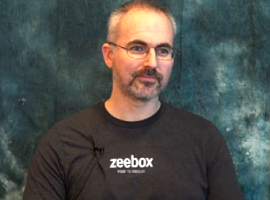InfoQ Homepage Team Collaboration Content on InfoQ
-
Richard Kasperowski on Building Great Teams
Richard Kasperowski talks about culture and technical skills, two things that matter for building great teams. He explores how technical skills and practices support agile, and shows how the core protocols can be used to establish a culture within teams that deliver great results.

-
David Mole on Self Selecting Teams and Drive
David Mole talks about implementing Spotify inspired squads and tribes at Trade Me, as well as the results of experiments in self-selection of teams and inspiration from the work of Daniel Pink.

-
Portia Tung on Hope as the Driver for Change and Improvement
Portia Tung works as an agile coach and shares some experience on making teams out of individuals and motivating those teams to follow a vision or reach a goal. One technique to reach a goal is to use hope as the combination of will-power and way-power. How much power do I have to follow my goals and how much creativity do I have to overcome any obstacles on my way?

-
Shane Hastie on Distributed Agile Teams, Product Ownership and the Agile Manifesto Translation Program
An interview with Shane Hastie about working effectively in distributed agile teams and making remote working work, why product ownership should be a team sport and how product owners teams can work with development teams and the Agile Manifesto translation program.

-
Diana Larsen on the Conditions for Best Job Ever, Team Communication and Five Rules of Learning
Diana talks about how to create the conditions for having the best job ever and describes a model for team collaboration and communication. She explains five simple rules for ongoing learning at the individual, team and organization level.

-
Glen Ford on Building Great Teams, Lean and DevOps
Glen Ford talks about his experiences in different organizations' environments, from start-ups to the likes of BBC. Glen discusses how to build great teams and why in his view Kanban works better than Scrum. Finally, Glen explains how Lean, DevOps and systems architecture all influence each other.

-
Floyd Marinescu on Leading Distributed Teams
Leading and working in distributed knowledge worker teams is reality for most organisations today. To get a perspective on some of the challenges and how to tackle them we spoke to Floyd Marinescu, CEO of C4Media, InfoQ's parent company. InfoQ is a globally distributed organisation with 35 fulltime and 150 part time contributors distributed across the whole world.

-
Changing Software Culture to Deliver
Greg Brockman, Stripe's CTO, relates how developers can determine if they are in a culture that has problems delivering software. With some of his insights and shifts in culture, developers can help their organization become unstuck from a poorly performing culture and shift into a more productive, organized, and effective team.

-
Woody Zuill on Mob Programming and No Estimates
Woody Zuill discusses Mob Programming, a practice where the whole team works on the same thing, at the same time in the same space on the same computer, as well as his thoughts on No Estimates.

-
Gil Broza on Individuals and Interactions, Empathic Leadership and Growing solid Teams
Gib Broza talks about his book "The Human Side of Agile", how to become an empathic leader, building solid teams that provide enduring and stable high performance. He provides some pragmatic advice for leaders in self-organizing agile teams on how create and nurture an environment which brings out the best in the team members.

-
Vickie Gray - The Core Protocols
Vickie Gray, author of the book Creating Time, shares her insights on the Core Protocols and how they can be used to solve many of the common problems that plague teams. The Core Protocols provide a common API on which the team can operate when performing Agile processes like Scrum or Kanban, and according to Vickie, we need this common API because humans are much more complicated than code.
-
The Core Protocols
In this interview, Jim and Michele McCarthy, co-founders of McCarthy Technologies, Inc. and authors of the book Software for Your Head, share their insights on the Core Protocols and the Core Commitments on which they’re based. These tools provide a set of structured interactions between people on a team, and when coupled with safety, freedom, and radical democracy, can lead a team to greatness.